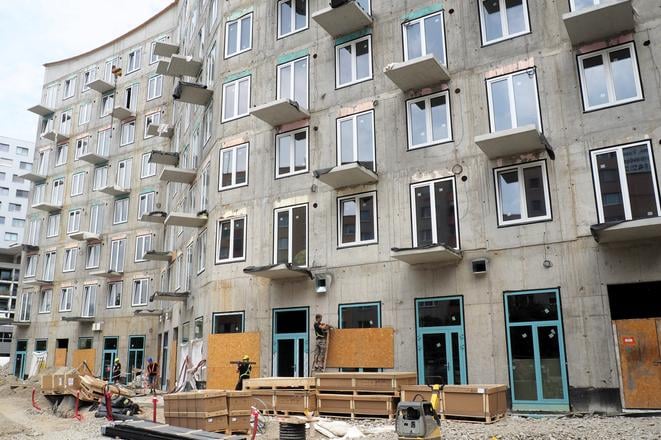Affordable housing in Slovakia is becoming increasingly unattainable, with public rental options making up just 1.6 percent of the nation’s housing stock—one of the lowest rates in Europe.
For low-income earners, rent consumes nearly half of their monthly income, far exceeding the recommended 30 percent, which should leave room for other essential needs, according to Amnesty International Slovakia, as highlighted by Denník N.
In June, the National Bank of Slovakia raised concerns about the rising inaccessibility of housing. With a recent hike in mortgage interest rates, housing affordability has plummeted to its lowest level since the 2010 global financial crisis. A Deloitte study further ranks Slovakia as having the least affordable housing in Europe. Bratislava, the capital, follows only Amsterdam in housing inaccessibility.
Widespread housing shortages and long waiting times
Slovakia faces a significant housing shortage, with a deficit of over 200,000 units. Last year, the country had just 419 dwellings per 1,000 inhabitants, well below the European average of 473. In Bratislava, for example, only 2,446 municipal flats are available out of nearly 250,000 units. Similarly, in Banská Bystrica, fewer than 300 municipally owned flats exist out of a total of 36,000. Amnesty’s research shows that wait times for public housing range from three to five years, and in Bratislava, the wait can extend up to six years.
Amnesty’s latest report highlights that low-income families are often forced into inadequate housing or temporary shelters, exposing them to significant risks to their safety, physical, and mental health. The situation is especially dire for Roma households, who face institutional discrimination and segregation in public housing, often confined to specific, substandard neighbourhoods.
Regional capital | The total number of flats | Municipal flats | The share of municipal flats within the total housing stock of the city |
|---|---|---|---|
Žilina | 37,024 | 1,142 | 3.1% |
Nitra | 35,973 | 1,029 | 2.9% |
Trnava | 29,289 | 725 | 2.5% |
Prešov | 33,396 | 545 | 1.6% |
Košice | 96,926 | 1,197 | 1.2% |
Bratislava | 248,199 | 2,446 | 1% |
Banská Bystrica | 35,654 | 297 | 0.8% |
Trenčín | 25,166 | 189 | 0.8% |
Barriers to public housing
Amnesty International conducted interviews with dozens of individuals experiencing homelessness or in housing crises, alongside social workers who support them. They identified key barriers to public housing: the requirement for a minimum verifiable household income, high security deposits, and the necessity of permanent residency within the municipality. These strict conditions disproportionately exclude low-income families. Even those with stable incomes, such as wages or pensions, struggle to access municipal housing due to these restrictions.
Housing subsidies, Amnesty found, are ineffective in mitigating these challenges.
According to Amnesty International, Slovakia is failing to meet its human rights obligations concerning the right to adequate housing.
One of the core issues, Amnesty notes, is the lack of clear responsibility within the government. While the Transport Ministry formally oversees housing policy, responsibilities are fragmented across multiple institutions and agencies. Amnesty reports that 11 laws directly govern the housing sector, with another 75 laws and 31 regulations indirectly influencing it. Yet, no single body holds comprehensive accountability for housing policy.
Municipalities are tasked with constructing and managing housing stock, as well as setting the criteria for access to municipal housing. However, in interviews with local officials, Amnesty found that many municipalities lack the funding and state support needed to address the housing crisis. Amnesty International is calling for the Slovak government to unify housing laws and designate a single institution responsible for housing policy.


